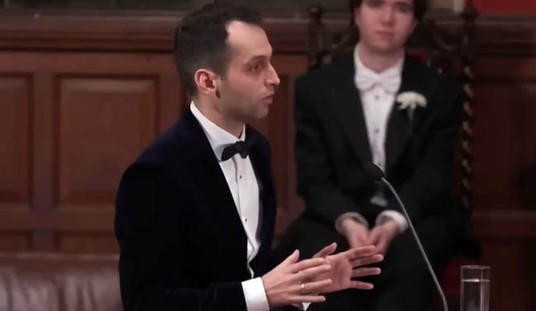California became the second state in the nation to legalize gay marriage by judicial fiat yesterday, but the court ruling will only heighten the political ramifications of the issue. In an election year, the debate will bring voters to the polls, and a referendum to amend the California constitution will do so in droves. Who wins in the rather remarkable circumstance of having the court decision highlight the ballot initiative? Already we see the presidential candidates carefully plotting their positions:
Democratic Sens. Barack Obama (Ill.) and Hillary Rodham Clinton (N.Y.) issued careful and nearly identical statements saying they support civil unions to protect the rights of same-sex couples. Both avoided taking a position on same-sex marriage, saying states should make such decisions.
Sen. John McCain‘s campaign said the Arizona Republican “supports the right of the people of California to recognize marriage as a unique institution sanctioning the union between a man and a woman.”
McCain, who last week decried judicial activism, “doesn’t believe judges should be making these decisions,” a spokesman added.
A different reaction came from California’s Republican governor, Arnold Schwarzenegger, who has twice vetoed legislation that would have allowed same-sex marriages.
“I respect the Court’s decision and as Governor, I will uphold its ruling,” he said in a statement. “. . . I will not support an amendment to the constitution that would overturn this state Supreme Court ruling.”
Schwarzenegger takes an absurd position in this stance. In one breath, he has supported legislation by judicial diktat while opposing direct democracy. If the people of California want to amend their constitution to define how government recognizes marriage, then elected officials should at least support that process and uphold the will of the people. The governor should have more interest in protecting the process of representative democracy through the proper determination of policy in the legislature and through referendums, and protecting the very processes that allow him to be engaged in policy formation, than in cheerleading for judicial activism.
Government recognition of marriage is a policy decision that should remain in the purview of the people. After all, no one argues that relationships require government sanction; two people can cohabitate without permission, as long as they’re consenting, unrelated adults. They can form contractual partnerships just like any two adults can, as long as the purposes remain legal. The argument in this case is for government sanction of the relationship as marriage — and as such is a public policy decision.
Had the people of California chosen to recognize gay marriage through legislation, I’d accept it — and in truth, I’d consider that a more rational policy than civil unions, which basically reproduce marriage with a different label. Government stopped being in the sacrament business at the moment it offered no-fault divorces. A civil-union contract has more binding power than does marriage these days. States would do best to leave the term “marriage” as an exclusive province of the churches and have all couples sign civil-union contracts instead, and let the individuals determine whether they feel “married” or not.
The two Democrats can’t bring themselves to say any of this, instead offering support for civil unions while trying their best not to annoy those clinging bitterly to their Bibles. While John McCain has the same position on civil unions, at least he understands the much greater issue of judicial activism better than Barack Obama, Hillary Clinton, or Arnold Schwarzenegger. This comes at a perfect time for McCain; he just delivered a speech on that very issue and highlighted the differences between himself and Obama, and this serves as a concrete example.
Could it help him win California in the fall? It’s possible but not terribly likely. The referendum will bring conservatives out in force this November, but it will also face a huge amount of opposition throughout the state and the intelligentsia. In truth, constitutional amendments usually make for bad policy; they act as sledgehammers when scalpels do better, and they’re difficult to reverse when necessary. Unfortunately, the court forced opponents of gay marriage into this tactic, and all will depend on whether they can get enough people to the polls.
The extent to which they do will benefit McCain without a doubt, and it could force the Democrats to spend a lot more time and money on the presidential race in the Golden State. They cannot afford to lose the massive Electoral College votes if they plan on winning the presidency. The Supreme Court probably just put California in play for the first time in 20 years.
Update: The Anchoress has a thoughtful take on the issue.









Join the conversation as a VIP Member